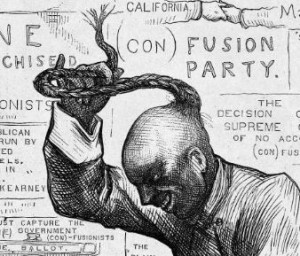From the Book of Numbers:
The earth opened its mouth and swallowed them up, along with their households — everyone who belonged to Korah and all their goods. So they with all that belonged to them went down alive into Sheol; the earth closed over them, and they perished from the midst of the assembly. All Israel around them fled at their outcry, for they said, “The earth will swallow us too!” And fire came out from the Lord and consumed the two hundred and fifty men offering the incense.
(From the Daily Office Lectionary – Numbers 16:32-35 (NRSV) – June 24, 2014)
 Believe it or not, I’ve actually had the last of these selected verses quoted to me as part of an argument against the use of incense in the church. I was in a conversation with someone about our use of incense in “high church” liturgies, being told (among other things) that incense was fine when we were younger and acting like hippies but now that we are older and mature we should put aside such childish ways, when this chestnut was pulled out. Since I’ve studied the Old Testament (as most clergy have) I knew my critic was misusing the text.
Believe it or not, I’ve actually had the last of these selected verses quoted to me as part of an argument against the use of incense in the church. I was in a conversation with someone about our use of incense in “high church” liturgies, being told (among other things) that incense was fine when we were younger and acting like hippies but now that we are older and mature we should put aside such childish ways, when this chestnut was pulled out. Since I’ve studied the Old Testament (as most clergy have) I knew my critic was misusing the text.
Such a reading is hard to square with other parts of Scripture in which the use of incense as an honorable offering to God is approved. For example, speaking through the Prophet Malachi God says, “For from the rising of the sun to its setting my name is great among the nations, and in every place incense is offered to my name, and a pure offering; for my name is great among the nations, says the Lord of hosts.” (Mal 1:11)
It’s even harder to harmonize with those places were the burning of incense in religious ceremonies is not only approved, it is commanded. For instance, in the Book of Exodus Moses is commanded to make an altar for incense upon which Aaron is to burn incense two times every day: “Aaron shall offer fragrant incense on it; every morning when he dresses the lamps he shall offer it, and when Aaron sets up the lamps in the evening, he shall offer it, a regular incense offering before the Lord throughout your generations.” (Ex 30:7-8)
And more than that, that reading doesn’t accord with the verse’s own context, and that’s what I’m thinking about today. The story of Korah’s and his followers’ destruction at the hand of an angry God has nothing to do with incense. The burning of incense although it figures prominently in the story is really incidental to the story; Korah and his tribe were destroyed because of their pride, because they sought to usurp the priesthood of Aaron which was not and never would be theirs. In the story, Aaron also burns incense to the Lord and his offering is accepted; further, shortly after this incident Aaron stops a plague among the people through the burning of incense. Clearly, incense is perfectly acceptable to God.
So to say that “fire coming out from the Lord and consuming the two hundred and fifty men offering incense” is an indictment of the use of incense in worship is proof-texting of the worst type, inconsistent with other scriptural references and inconsistent with its own context.
I recall a joke (or maybe it’s a true story) about a preacher who abhorred the traditional Chinese men’s hairstyle holding forth in California in the late 1800s urging Chinese immigrants to abandon the queue or “topknot.” All Chinese men, but particularly those who had converted to Christianity, he argued, should cut off their queues because Christ himself had uttered the words, “Topknot go down!” And he was correct, sort of. What Jesus had said was, “Let him who is on the housetop not go down to take what is in his house . . . .” (Mt. 24:17) Picking and choosing the Bible’s words out of context is not a new phenomenon.
The only way to combat proof-texting is knowing the Scriptures oneself. Jesus is our model in this regard. Tempted by the devil after his baptism, he was able to answer each of Satan’s references to Scripture with counter-references of his own. (Matt. 4) If we are to respond to misuses of Scripture, we must know it ourselves.
Now, I don’t agree with my incense critic about old age and maturity being a reason to give up incense, but I suppose there might be something to that. Perhaps given the respiratory problems some older folks have, one can be too old for incense. However, one is never too old for Christian education and Bible study!
====================
A request to my readers: I’m trying to build the readership of this blog and I’d very much appreciate your help in doing so. If you find something here that is of value, please share it with others. If you are on Facebook, “like” the posts on your page so others can see them. If you are following me on Twitter, please “retweet” the notices of these meditations. If you have a blog of your own, please include mine in your links (a favor I will gladly reciprocate). Many thanks!
====================
Father Funston is the rector of St. Paul’s Episcopal Church, Medina, Ohio.



Leave a Reply